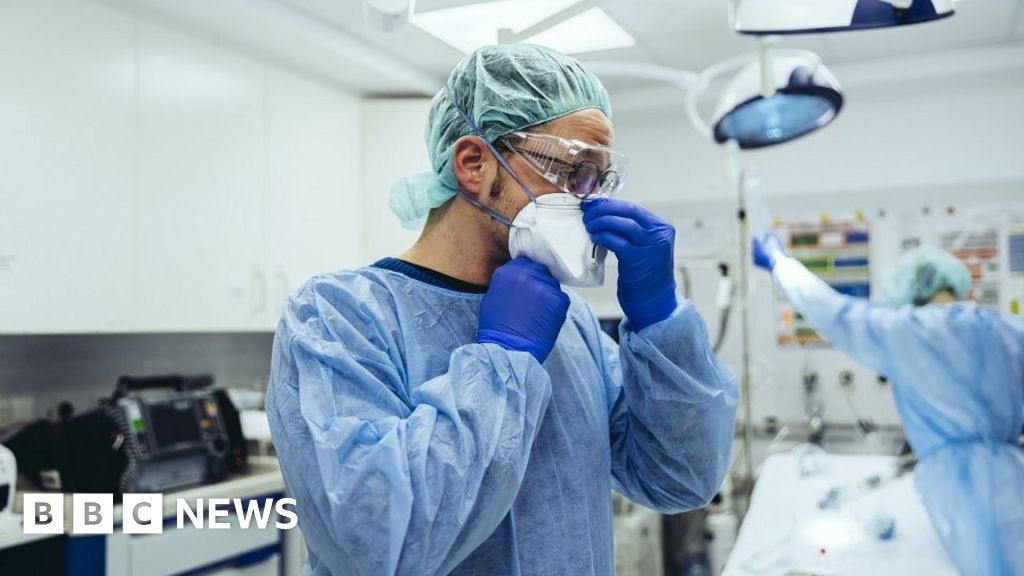
Fifty million face masks bought by the government in April will not be used in the NHS because of safety concerns.
The government says the masks, which use ear-loop fastenings rather than head loops, may not fit tightly enough.
They were bought for healthcare workers from supplier Ayanda Capital as part of a £252m contract.
Ayanda says the masks meet the specifications the government had set out. The government says its safety standards process is “robust”.
It also emerged that the person who originally approached the government about the deal was a government trade adviser who also advises the board of Ayanda.
But he told the BBC his position played no part in the awarding of the contract.
In the early weeks of the pandemic the NHS experienced severe shortages of personal protective equipment (PPE).
The government says it had to find new suppliers quickly to meet demand and to compete with rising global competition.
On 29 April the Department of Health and Social Care signed the £252m contract with Ayanda Capital Limited to supply two types of face masks.
The most expensive part of the order consisted of 50 million FFP2 respirator masks, which are designed to protect healthcare workers from inhaling harmful particles.
According to legal papers seen by the BBC, the government says these masks will now not be used in the NHS because of a safety issue.
The document says that there is concern about whether they would fit adequately.
To be effective these types of face mask need to fit tightly to create a seal between the mask and the wearer’s face.
Anyone who wears them for work is required to undergo a face fit test.
“The face fit is either a pass or a fail and there are more fails on products with ear loops than there are on products with head harnesses,” says Alan Murray, chief executive of the British Safety Industry Federation.
“That means that it wouldn’t necessarily provide the protection that was required from it.”
It is not clear what will happen now to the 50 million masks.
Ayanda Capital also supplied 150 million Type IIR masks, which the government says are unaffected.
Most have now been delivered but they have also not yet been released for use in the NHS and are awaiting further testing.
‘Staggering’ amounts spent
The information was disclosed in a legal response to the Good Law Project, which is seeking to challenge the government in the courts over three PPE contracts it awarded, including Ayanda Capital’s.
The campaign group argues the government’s awarding of contracts directly to companies during the pandemic, rather than opening them to competition, may have been unlawful.
“It’s taken this extraordinary sum of public funds and wasted it on PPE that it itself says cannot be released for use in the NHS because it’s not safe,” said Jolyon Maugham, the Good Law Project’s director.
“We do think that it’s important that the court take a look at these contracts, that it declare them to be unlawful and that there be full transparency of how these staggering amounts of public money have been spent.”
Government adviser
The government has also disclosed that the original approach to sell the masks came not from Ayanda Capital but from a businessman called Andrew Mills.
His company Prospermill had secured the rights to the full production capacity of a large factory in China to produce masks and was able to offer a large amount almost immediately.
But the legal document seen by the BBC notes that Mr Mills requested the government instead sign the contract for the masks with Ayanda Capital, whose board he advises, because it could arrange overseas payment more quickly.
Mr Mills is also an adviser to the UK Board of Trade.
He told the BBC his position played no part in the award of the contract which was subject to the same evaluation as all offers made in response to the government’s request for help.
Ayanda Capital Limited said: “The masks supplied went through a rigorous technical assurance programme and meet all the requirements of the technical specifications which were made available online through the government’s portal.
“There are provisions in our contract for product to be rejected if it did not meet the required specification as per the contract. These provisions have not been activated.”
A government statement said: “Throughout this global pandemic, we have been working tirelessly to deliver PPE to protect people on the frontline.
“Over 2.4 billion items have been delivered, and more than 30 billion have been ordered from UK-based manufacturers and international partners to provide a continuous supply, which meets the needs of health and social care staff both now and in the future.
“There is a robust process in place to ensure orders are of high quality and meet strict safety standards, with the necessary due diligence undertaken on all government contracts.”




